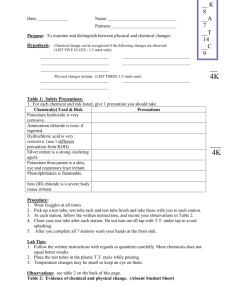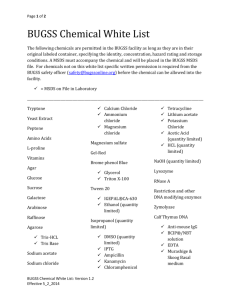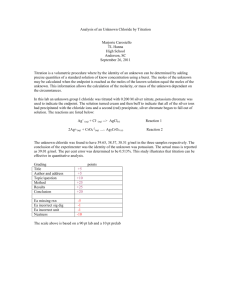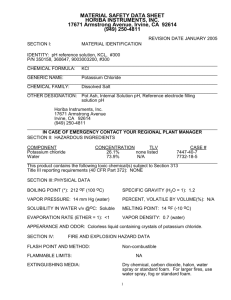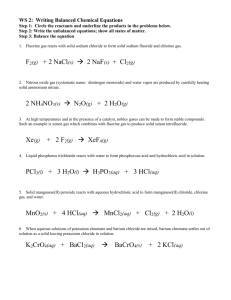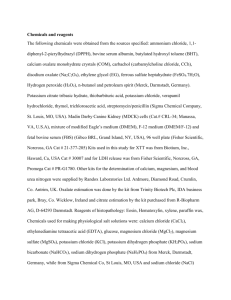Potassium Chloride Concentrate Solution for IV Administration
advertisement
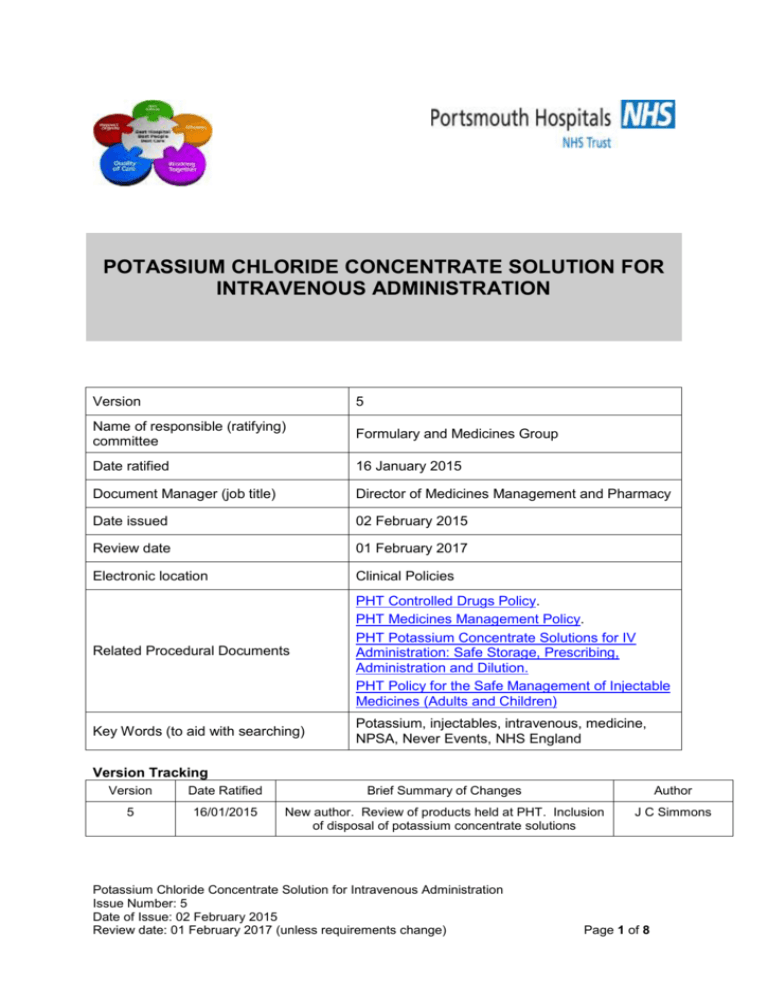
POTASSIUM CHLORIDE CONCENTRATE SOLUTION FOR INTRAVENOUS ADMINISTRATION Version 5 Name of responsible (ratifying) committee Formulary and Medicines Group Date ratified 16 January 2015 Document Manager (job title) Director of Medicines Management and Pharmacy Date issued 02 February 2015 Review date 01 February 2017 Electronic location Clinical Policies Related Procedural Documents PHT Controlled Drugs Policy. PHT Medicines Management Policy. PHT Potassium Concentrate Solutions for IV Administration: Safe Storage, Prescribing, Administration and Dilution. PHT Policy for the Safe Management of Injectable Medicines (Adults and Children) Key Words (to aid with searching) Potassium, injectables, intravenous, medicine, NPSA, Never Events, NHS England Version Tracking Version Date Ratified Brief Summary of Changes Author 5 16/01/2015 New author. Review of products held at PHT. Inclusion of disposal of potassium concentrate solutions J C Simmons Potassium Chloride Concentrate Solution for Intravenous Administration Issue Number: 5 Date of Issue: 02 February 2015 Review date: 01 February 2017 (unless requirements change) Page 1 of 8 QUICK REFERENCE GUIDE This policy must be followed in full when developing or reviewing and amending Trust procedural documents. For quick reference the guide below is a summary of actions required. This does not negate the need for the document author and others involved in the process to be aware of and follow the detail of this policy. This policy applies to all healthcare workers involved in the storage, prescribing, administration and dilution of potassium concentrate solutions. This includes, but is not exclusive to, doctors, pharmacists, pharmacy technicians / assistant technical officers, nurses, midwives, operating department practitioners, healthcare support workers, and delivery drivers. The policy covers professional accountability of groups of workers and the following processes regarding use of potassium containing concentrate solutions for intravenous use: Safe storage Receipt Prescribing Dilution Administration Disposal Potassium Chloride Concentrate Solution for Intravenous Administration Issue Number: 5 Date of Issue: 02 February 2015 Review date: 01 February 2017 (unless requirements change) Page 2 of 8 1. INTRODUCTION This policy describes the storage and use of potassium chloride concentrate solution intended for intravenous administration in clearly designated areas within PHT which provides evidence for compliance with National Patient Safety Agency Patient Safety Alert PSA01: Potassium Chloride Concentrate Solution. 2. PURPOSE This policy has been developed to outline procedures to minimise and manage the risk of inadvertent administration of potassium chloride concentrate solution by restricting its availability as ampoules and vials, in accordance with the recommendations of the NPSA. More recently this policy is instrumental in reducing the risk of ‘never events’ as originally determined by the DoH. This policy aims to improve the awareness of PHT staff in the safe storage, ordering and receipt, prescribing, administration and disposal of potassium chloride concentrate solution intended for intravenous administration. 3. SCOPE This policy applies to all staff working within Portsmouth Hospitals NHS Trust. ‘In the event of an infection outbreak, flu pandemic or major incident, the Trust recognises that it may not be possible to adhere to all aspects of this document. In such circumstances, staff should take advice from their manager and all possible action must be taken to maintain ongoing patient and staff safety’ 4. DEFINITIONS (see full list, Section 4 of the PHT Medicines Management Policy) Potassium Chloride Concentrate Solution – Potassium chloride 15% is the injectable preparation in use at Queen Alexander Hospital, Portsmouth, in the following critical care areas: Potassium chloride concentrate solution Concentration Form Critical Care Areas Potassium Chloride 15% (1.5g/10ml) 2 mmol/ml 20 x 10ml ampoules Critical Care Unit (E5) Paediatrics (A7 Starfish & A8 Shipwreck) Children’s Assessment Unit A Level Renal (G7) Renal High Care (G6) Potassium Chloride Concentrate Solution for Intravenous Administration Issue Number: 5 Date of Issue: 02 February 2015 Review date: 01 February 2017 (unless requirements change) Page 3 of 8 Newborn Unit (B9) Emergency Dept C Level Cardiology (C7) Respiratory (E8) 5. DUTIES AND RESPONSIBILITIES Refer to the PHT Medicines Management Policy and the PHT Policy for the Safe Management of Injectable Medicines (Adults and Children) for an explanation of the duties and responsibilities. 6. PROCESS 6.1 Restrictions to stock holding Stock of potassium chloride concentrate solution will be restricted to the pharmacy department and the designated critical care areas as listed in section 4 of this document to reduce the availability and risk of inadvertent use. 6.2 Storage Stock of potassium chloride concentrate solution will be kept in their original outer container and stored in the controlled drug cupboards of the designated critical care areas ( PHT Controlled Drugs Policy.). This is to ensure that the solution is separated from the common diluting solutions such as water for injections and sodium chloride 0.9% for injection. 6.3 Ordering Potassium chloride concentrate solution will only be supplied from the pharmacy department to the designated critical care areas if the order has been made using a CD order book (PHT Controlled Drugs Policy.). Transfers between clinical areas are prohibited. 6.4 Documentation of ordering and administering Documentation of ordering, supply and receipt of potassium chloride concentrate solution will use the same system as controlled drugs (PHT Controlled Drugs Policy.). Records of all administration to patients will be documented in a designated controlled drugs record book. A robust audit trail comprising ordering, storage, receipt, destruction and administration of potassium chloride concentrate solution will be maintained to provide accountability. 6.5 Prescribing Prescriptions for potassium solutions for intravenous use will be restricted to commercially available dilute solutions so eliminating the need for solutions to be made and potential errors. Deviation from this would only occur in the case of an unequivocal need for a special solution to be compounded. 6.6 Approved range of products Potassium Chloride Concentrate Solution for Intravenous Administration Issue Number: 5 Date of Issue: 02 February 2015 Review date: 01 February 2017 (unless requirements change) Page 4 of 8 Commercially prepared intravenous infusions containing potassium are available to all ward areas to reduce the need for these areas to keep concentrated solutions. See Drug Therapy Guideline No: 2.05 PHT Potassium Concentrate Solutions for IV Administration :Safe Storage, Prescribing, Administration and Dilution. 6.7 Second check When dilution of potassium chloride concentrate solution is required in a designated critical area a second practitioner should always check against the prescription for correct selection of product, dosage, dilution, mixing, labelling and administration route and rate. See Drug Therapy Guideline No: 2.05 PHT Potassium Concentrate Solutions for IV Administration :Safe Storage, Prescribing, Administration and Dilution. 6.8 Administration rate All infusions containing potassium at concentrations greater than 40mmol/l must be administered via a high-risk infusion pump to control the rate of infusion. Usual maximum infusion rate in adults is 10mmol per hour. Faster rates may be used, however, ECG monitoring is required if the rate of infusion is greater than 20mmol per hour In severe hypokalaemia the infusion rate should not exceed 40mmol per hour. (In exceptional circumstances in the Department of Critical Care only and only when sanctioned by the consultant in charge, the rate may exceed 40 mmol/hour.) In paediatric and neonatal patients the maximum infusion rate should be 0.2mmol/kg/hour. (In exceptional circumstances, only when sanctioned by the consultant in charge, the rate used may be up to 0.5mmol/kg/hour.) The maximum concentration of potassium that can be given via a peripheral line is 40mmol/l, concentrations greater than this should be given via a central line. 6.9 Disposal The procedure for handling expired or unwanted stock of concentrated solutions is the same as for other controlled drugs: (PHT Controlled Drugs Policy) Stock identified as being past the expiry date or no longer wanted must be clearly identified as not for use and retained in the locked controlled drugs cupboard used for storage of concentrated potassium solutions. The stock must not be signed out of the controlled drugs register at this stage. The ward/directorate pharmacist should be contacted and they will arrange for removal. Unwanted or expired ready-diluted commercially available solutions can be returned to pharmacy or disposed of in the POM bins. 6.10 Out of hours The on-call pharmacist must be contacted to arrange a supply of potassium containing concentrate solutions. The out of hours definition can be found on the pharmacy webpage. 6.11 Ante-natal clinic During late termination of pregnancy potassium chloride 15% (2mmol/ml) is required for use according to Royal College of Obstetricians and Gynaecologists to ensure foetal asystole prior to birth. In these cases a prescription will be written by the Potassium Chloride Concentrate Solution for Intravenous Administration Issue Number: 5 Date of Issue: 02 February 2015 Review date: 01 February 2017 (unless requirements change) Page 5 of 8 consultant for 1 x 10ml ampoule of potassium chloride 15% which will be dispensed by the pharmacy department and delivered to the prescriber for immediate use. If required out of hours the On Call Pharmacist must be contacted for supply to permit the issue of potassium chloride concentrate solution in these circumstances. If for any reason the potassium chloride it is not used, the ampoule must be returned to pharmacy as soon as is practical to ensure the unused ampoule is accounted for. 6.12 Patient Safety Incidents / Never Events Never events are a sub-set of Serious Incidents and are defined as ‘serious, largely preventable patient safety incidents that should not occur if the available preventative measures have been implemented by healthcare providers The never event with regard to potassium chloride concentrate solution refers to death or severe harm as a result of maladministration of a potassium-containing solution. In this definition maladministration refers to: Selection of strong potassium solution instead of intended other medication Wrong route administration, for example a solution intended for central venous catheter administration given peripherally Infusion at a rate greater than intended Any medication-related incident fulfilling this criteria and any adverse incident involving potassium chloride concentrate solution should be reported using Datixweb as a serious incident requiring investigation (SIRI) following the Policy for the Management of Serious Incidents Requiring Investigation (SIRI) Policy. 7. TRAINING REQUIREMENTS The contents of this policy and risks associated with potassium chloride concentrate solutions will be included in induction training for pharmacy, nursing and clinical staff. Refer to the PHT Medicines Management Policy for details regarding training and competencies. 8. REFERENCES AND ASSOCIATED DOCUMENTATION Patient safety alert – Potassium chloride concentrate solutions, 2002 (updated 2003), available at http://www.nrls.npsa.nhs.uk/resources/?entryid45=59882 Standard Operating Protocol fact sheet; Managing Concentrated Injectable Medicines, part of the WHO High 5’s project, available at https://www.high5s.org/bin/view/Main/WebHome The never events list; 2013/14 update, NHS England available at http://www.england.nhs.uk/wp-content/uploads/2013/12/nev-ev-list-1314-clar.pdf (accessed 8/1/15) Injectable Drug Administration Guide, UCL Hospitals, 3rd Edition. 2011 Neonatal Formulary 6. The Northern Neonatal Network. British Medical Journal Books 2011 BNFc December 2014 available at https://www.medicinescomplete.com/mc/bnfc/current/PHP14008-intravenouspotassium.htm (accessed 9/1/15) Potassium Chloride Concentrate Solution for Intravenous Administration Issue Number: 5 Date of Issue: 02 February 2015 Review date: 01 February 2017 (unless requirements change) Page 6 of 8 9. EQUALITY IMPACT STATEMENT Portsmouth Hospitals NHS Trust is committed to ensuring that, as far as is reasonably practicable, the way we provide services to the public and the way we treat our staff reflects their individual needs and does not discriminate against individuals or groups on any grounds. This policy has been assessed accordingly All policies must include this standard equality impact statement. However, when sending for ratification and publication, this must be accompanied by the full equality screening assessment tool. The assessment tool can be found on the Trust Intranet -> Policies -> Policy Documentation Our values are the core of what Portsmouth Hospitals NHS Trust is and what we cherish. They are beliefs that manifest in the behaviours our employees display in the workplace. Our Values were developed after listening to our staff. They bring the Trust closer to its vision to be the best hospital, providing the best care by the best people and ensure that our patients are at the centre of all we do. We are committed to promoting a culture founded on these values which form the ‘heart’ of our Trust: Respect and dignity Quality of care Working together No waste This policy should be read and implemented with the Trust Values in mind at all times. Potassium Chloride Concentrate Solution for Intravenous Administration Issue Number: 5 Date of Issue: 02 February 2015 Review date: 01 February 2017 (unless requirements change) Page 7 of 8 10. MONITORING COMPLIANCE WITH PROCEDURAL DOCUMENTS This document will be monitored to ensure it is effective and to assurance compliance. Minimum requirement to be monitored Annual Medicines Management Audit Lead Risk Management Pharmacy Technician Tool JAC pharmacy stock control system Frequency of Report of Compliance Annually Reporting arrangements Policy audit report to: Medication safety committee Policy audit report to: Policy audit report to: Potassium Chloride Concentrate Solution for Intravenous Administration Issue Number: 5 Date of Issue: 02 February 2015 Review date: 01 February 2017 (unless requirements change) Page 8 of 8 Lead(s) for acting on Recommendations CSC Governance Leads
